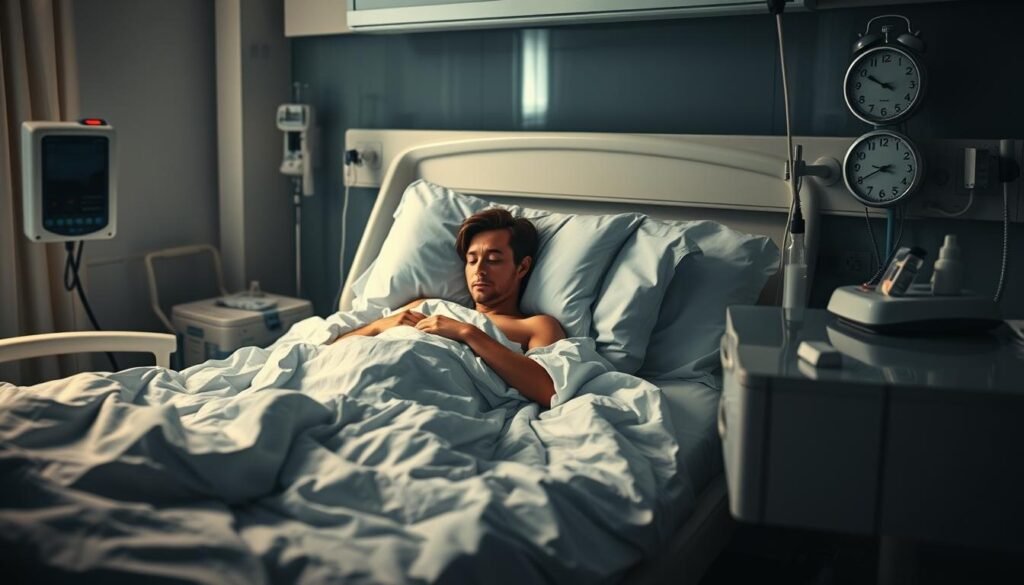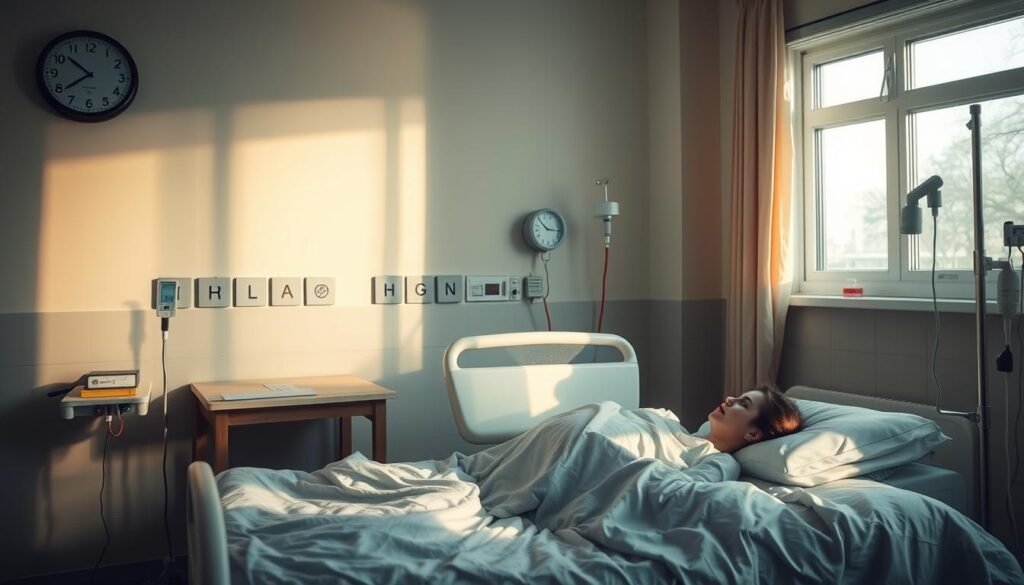About 10% to 15% of adults deal with chronic insomnia. A lot of this is due to the stress from surgery. Post surgical insomnia makes it hard to sleep well during recovery. This can really impact how fast someone heals.
After surgery, pain and discomfort can make sleep hard. Anxiety and hospital noises also hurt your sleep. It’s important to know why this happens to fix it. This article will talk about how long insomnia lasts after surgery, what causes it, and how to sleep better.
Want to learn more about sleep issues? Check out this detailed guide on sleep disorders.
Key Takeaways
- Post surgical insomnia affects 10% to 15% of adults, often related to surgery-induced stress.
- Insomnia duration can vary from a few days to weeks post-surgery.
- Pain management and anxiety reduction are essential for improving sleep quality after surgery.
- The hospital environment plays a significant role in sleep disruption for surgical patients.
- Implementing a relaxing nighttime routine can aid in better recovery and sleep patterns.
Understanding Post Surgical Insomnia
Many patients face sleep issues after surgery, known as post-surgical insomnia. It’s vital to understand this to help recovery. Sleep problems can result from many factors. This makes it important for both patients and healthcare workers to be aware of the issue.
Insomnia can mean trouble falling asleep or staying asleep. It leads to significant tiredness. Older adults are especially at risk. Factors like other health conditions and sleep apnea can make it worse. The type of surgery and anesthesia also play a big role in sleep quality after surgery.
Pain is a big reason for insomnia after surgery. It makes it hard for patients to sleep well. Hospitals can be noisy, especially intensive care units. This noise, along with pain and worry, makes recovering even harder.
Knowing how surgery affects sleep is the first step in solving these issues. It’s important to address sleep problems early. Not doing so can lead to bigger health problems. To learn more about dealing with sleep issues after surgery, visit here.
| Contributing Factors | Description |
|---|---|
| Age | Elderly patients tend to experience more sleep disturbances post-surgery. |
| Comorbidities | Pre-existing conditions like obstructive sleep apnea increase risk. |
| Surgery Type | Major surgeries typically result in more severe sleep disruptions than minor procedures. |
| Pain Management | Postoperative pain is a significant factor leading to insomnia. |
| Environmental Stress | Factors like noise and light in hospital settings greatly affect sleep quality. |
| Anxiety | Both preoperative and postoperative anxiety contribute to sleep disturbances. |
Causes of Insomnia After Surgery
About 30% of patients can’t sleep well after surgery. This insomnia is usually due to physical pain, worry, and medicine effects. Managing these can help improve sleep.
Pain is a big reason why people can’t sleep after surgery. Nearly half feel uncomfortable the first day after the procedure. Surgery can cause swelling, leading to more discomfort and restless nights. Good pain control is key for better sleep during recovery.
Medications, like those for pain relief, often mess with sleep. Anesthesia and opioids can break your sleep into smaller, less restful pieces. Also, hospital noises and constant check-ups can make sleeping harder after surgery.
Feeling anxious about surgery can also make insomnia worse. The stress from surgery disrupts normal sleep. However, making your sleeping area quiet and dark might help.
Insomnia usually lasts only a short time after surgery. But it can become long-term if sleep habits don’t improve. Managing pain well, relaxing, and keeping a regular routine are important. These steps can help you sleep better.
How Long Does Post Surgical Insomnia Last
How long post-surgical insomnia lasts differs from person to person. Knowing this can ease worries and help set realistic timeframes for recovery. In the first week after surgery, many people report trouble sleeping. Usually, sleep begins to improve after this period. However, the timing can vary depending on various factors.
Duration Variability Based on Surgery Type
The kind of surgery you have affects how long the insomnia might last. Major surgeries like joint replacements or heart operations tend to lead to longer periods of insomnia. On the other hand, people who have minor surgeries recover quicker. Symptoms of insomnia usually start within the first six nights post-surgery. For most, sleep returns to normal within a week.
Factors Influencing Sleep Recovery
Several things play a part in how quickly you recover your sleep patterns after surgery. Here are key factors that influence the duration of post-surgical insomnia:
- Type of Anesthesia: General anesthesia can significantly change sleep patterns.
- Pain Management: Painkillers might also affect your sleep.
- Individual Health Conditions: Those with existing health issues might take longer to recover.
- Hospital Stay Duration: Longer hospital stays can disrupt normal sleep cycles.
- Post-Surgery Instructions: How well you follow post-operative care recommendations impacts your recovery and sleep.
Knowing these factors helps in setting the right expectations for recovering from surgical procedure-related insomnia. It aids in planning for a smoother recovery process.
| Surgery Type | Typical Insomnia Duration (Days) | Recovery Timeframe (Days) |
|---|---|---|
| Major Surgery | Up to 14 | About 7-14 |
| Minor Surgery | 5-7 | About 3-5 |
| Elective Surgery | 5-10 | About 1-7 |
Post-Operative Sleep Problems
After surgery, many patients find their sleep affected significantly. Studies show that 8.8% to 79.1% of these patients face sleep issues. This often results from changes in their sleep patterns during recovery.
Medications significantly affect sleep quality. Painkillers like opioids disturb natural sleep cycles. A study found insomnia rates in patients jumped from 8.8% before hip surgery to 17.8% afterwards. It’s vital to consider how pain medications affect sleep after surgery.
The hospital environment also disrupts sleep. This is especially true for patients in intensive care after thoracic surgery. A particular study revealed that 62% of these patients had sleep problems six months later. These issues often remained for a long time.
Existing health conditions can make sleep problems worse after surgery. About one in four patients getting heart surgery also have sleep apnea, a usually unnoticed condition. Early detection is key to improve recovery.
Sleep issues post-surgery can start a chain of other health problems. Patients may feel tired, anxious, depressed, or even struggle with thinking clearly. This shows how crucial sleep is to healing after surgery.

| Type of Surgery | Pre-Operative Insomnia Rate | Post-Operative Insomnia Rate | Notes |
|---|---|---|---|
| Lung Cancer Surgery | N/A | 49.7% | Sleep disturbances one year post-operatively |
| Thoracic Surgery | N/A | 62% (6 months) | Poor sleep quality in ICU patients |
| Arthroscopic Hip Surgery | 8.8% | 17.8% | Increase due to pain and opioid use |
| Cardiac Surgery | N/A | Undiagnosed sleep apnea in 80% of cases | Highlighting the importance of diagnosing conditions pre-surgery |
Identifying Sleep Issues After Surgery
After surgery, many face sleep challenges. Identifying these issues is key for a good recovery. Knowing common symptoms helps patients get timely help.
Common Symptoms of Post-Surgery Sleeplessness
There are several signs of post-surgery insomnia. Knowing them helps in taking quick action. The most common symptoms include:
- Trouble falling asleep: Starting to sleep can be hard for those recovering.
- Frequent waking during the night: This can stop the healing needed during sleep.
- Daytime fatigue: Feeling tired all day is common with poor sleep.
- Increased anxiety or irritability: Not sleeping well can make emotions harder to control.
- Pain management challenges: Pain can make it hard to get good sleep, affecting recovery.
Recognizing these symptoms is important for dealing with sleep problems after surgery. Getting help quickly can make recovery smoother.
Managing Post-Op Sleep Disturbances
After surgery, many patients find it hard to sleep. It’s important to know that 10% to 15% of adults can have long-term insomnia. Surgeries can make sleep problems worse, especially because of pain. Most surgeries cause some discomfort.
To help sleep better, try these tips:
- Use a sleep mask to keep out unwanted light.
- Keep the recovery area quiet, as noise can interfere with sleep.
- Make sure the room temperature is comfortable.
- Try deep breathing exercises to calm surgery-related stress.
Talking to your doctors is important for handling sleep troubles after surgery. Ask about changing medications to improve sleep. Options include non-opioid pain relievers to lessen pain’s effect on sleep.
Hospital settings can make sleeping hard. Bright lights and constant noise disturb natural sleep cycles. Paying attention to these factors helps a lot during recovery.
With the right steps, it’s possible to manage sleep issues post-surgery. A good plan for dealing with pain, anxiety, and the surroundings can boost sleep quality. This leads to a smoother recovery. For more tips, check out this useful guide.

Surgery Recovery Insomnia: Tips for Improvement
Dealing with insomnia after surgery requires smart strategies to improve sleep quality. Keeping a regular sleep schedule is crucial. Sleeping and waking up at the same time every day supports your natural sleep cycle.
Light physical activities enhance sleep, with your doctor’s OK. They can ease discomfort and help you relax before sleep. Be careful with sleep aids, though. Always talk to a doctor before using them, especially after surgery.
Making your sleeping area conducive to rest is very important. A dark and quiet room helps prevent issues that may worsen insomnia. Also, your diet affects how well you sleep. Avoid large meals and caffeine before bedtime to fall asleep easier.
To sum up, following these improvement tips can greatly improve sleep during recovery. Focus on staying comfortable, creating a restful space, and managing pain or worry. These actions will help overcome sleep problems after surgery.
Surgical Procedure Insomnia Duration
After surgery, people often don’t sleep well. This varies from person to person. It’s due to many things, including the surgery type. Studies show about 10% to 15% of adults have long-term insomnia. Right after surgery, short-term sleep issues are usual because of stress from the procedure.
Wondering how long trouble sleeping lasts after surgery? It can be a few days to weeks. It depends on the person. A 2022 study found sleep gets disturbed in the first six days after surgery. But, for most, it gets better within a week.
Big surgeries disturb sleep more than small ones. Things like pain and swelling make sleep harder to come by. Also, being in a hospital doesn’t help. Noise, lights, and worry about getting better can make sleeping tough.
General anesthesia affects sleep, especially in older people. Pain killers and other medicines after surgery can also affect how well you sleep. To sleep better, controlling pain and worry helps. Making your sleeping area comfortable is key. Check out these tips on improving sleep after surgery.
| Factor | Impact on Sleep |
|---|---|
| Type of Surgery | More invasive surgeries lead to greater sleep disturbances. |
| Pain Level | Higher pain levels correlate with poor sleep quality. |
| Hospital Environment | Noisy and brightly lit settings disrupt circadian rhythms. |
| Medications | Certain medications can cause sedation or wakefulness. |
| Anxiety and Stress | Increased anxiety before and after surgery can intensify insomnia. |
In short, it’s normal to not sleep well after surgery. But, this usually gets better in a week. If sleep problems don’t get better, talking to a doctor is a good idea. They can look into it and help you find ways to sleep better.

Recovering Sleep Patterns After Surgery
Getting your sleep back on track after surgery is not easy for everyone. How long it takes varies greatly. It depends on the person and the surgery they had. Changes in melatonin and sleep cycles can make sleeping hard. This might lead to more pain and a chance of getting sick. Knowing about these issues can really help people recover better.
It usually takes weeks or months to get back to normal sleep after surgery. During this period, you might not sleep well and wake up a lot. Working on good sleep habits is key. Keeping your room cool, between 60°F to 67°F, boosts how well you sleep. Getting 7-9 hours of sleep at night is also important for healing after surgery.
If you’re having trouble sleeping, taking extra melatonin or sleep meds like zolpidem (Ambien) might help. Choosing surgeries that are less harsh can also lessen sleep problems. For example, people who have laparoscopic cholecystectomy often sleep better than those who have open surgeries.
In short, focusing on sleep and using good recovery methods helps fix sleep schedules after surgery. It also improves overall health and recovery.
| Recovery Tips | Description |
|---|---|
| Prioritize Sleep | Aim for 7-9 hours of restful sleep each night to enhance recovery outcomes. |
| Create a Comfortable Environment | Maintain room temperatures between 60°F to 67°F for optimal sleep conditions. |
| Consider Melatonin or Sleep Medications | Supplementary melatonin or medications like zolpidem can improve sleep quality. |
| Choose Less Invasive Surgical Options | Laparoscopic procedures generally lead to fewer sleep-related disturbances. |
| Manage Noise Levels | Reduce hospital noise and disruptions to facilitate uninterrupted sleep. |
Conclusion
Post-surgery insomnia uncovers how sleep impacts recovery. Pain, and the effects of meds and anesthesia, mess with sleep. The busy, noisy hospital setting also makes good sleep hard.
Stress and worry can make sleep problems worse, causing endless thoughts at night. It’s often hard to get cozy due to physical limits. This lack of sleep harms mood, thinking skills, and mental health, making recovery tough.
Taking steps to handle insomnia is key for healing. Talking to doctors can help find ways to sleep better. A good sleep plan helps a lot in getting back to health after surgery.